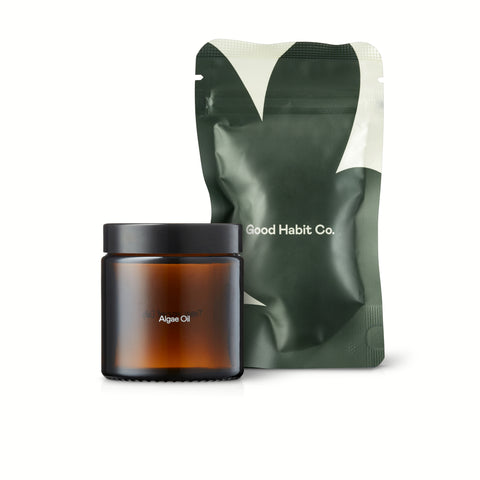-
Free shipping with subscription
-
Pay with MobilePay
-
We donate 1% to a good cause
-
30 day flavour guarantee
Why Algae Oil over fish oil?
Fish get their omega-3s from algae, so why not skip the fish and go straight to the source?
Our algae oil is a clean, plant-based way to get EPA and DHA—without the fishy aftertaste. It’s sustainably sourced, fish-free, and perfect for vegans or anyone looking for a simple, plant-based alternative.
Simple, straightforward, and just as effective.
Yes, algae oil is a plant-based source of omega-3s, including EPA and DHA—just like fish oil. Algae oil typically contains more DHA, which contributes to normal brain function, vision, and heart function. Fish oil, on the other hand, is often higher in EPA. Both sources provide omega-3s, but algae oil is a great option for those looking for a plant-based alternative.
Your body can absorb and use omega-3s from algae oil—just like from fish oil. Studies show that omega-3s from algae oil are bioavailable and can be absorbed in a similar way. A simple, fish-free way to get your omega-3s.
Yes, algae oil is a great source of omega-3s, especially DHA, which contributes to normal brain function, vision, and heart function. While fish oil contains more EPA, algae oil’s high DHA content makes it a solid choice for those looking to support brain and eye function. It’s a clean, plant-based way to get your omega-3s without the environmental impact of fish oil.
Algae oil has been available for years and is widely used as a plant-based source of omega-3s. Recently, its popularity has grown due to increasing awareness of sustainability and plant-based diets. As demand rises, production has expanded, making it more accessible and affordable.
RESEARCH ARTICLE
"To eat more sustainably, we need to eat more from the bottom of the food chain and less from the top."
Plant-Based Seafood – Seaweed and Microalgae as Sources of Omega-3 Fatty Acids, Protein, and Vitamins in the Food of the Future
DTU National Food Institute, 2023














